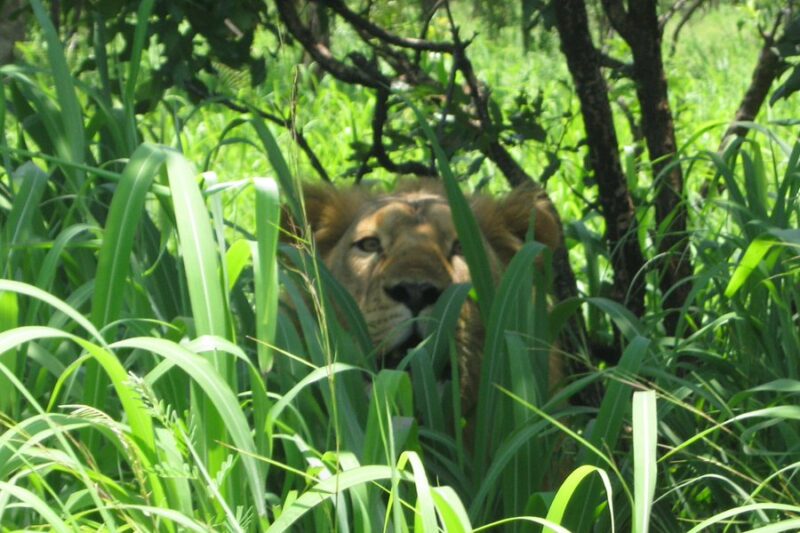Security at Kainji Lake National Park is ‘getting out of hand’ and is ‘a much more explosive situation than anticipated’ – new report by Dutch think tank Clinendael Institute.
Jihadi fighters, believed to be linked to al-Qaeda, have crossed from neighbouring Benin into a popular national park in northwestern Nigeria and pose a “serious security threat”.
A report published on Wednesday, June 19, by the Clingendael Institute, a Dutch think tank that has done extensive research in the Sahel, said the fighters had settled in the 5,300 square-kilometre Kainji Lake National Park in Niger State, heightening the security threat in the northwest.
Other armed groups had also gained access through the park, which is one of Nigeria’s largest, the report said.
Security at the park was “getting out of hand” and was “a much more explosive situation than we had anticipated”, said Kars de Bruijne, one of the authors of the report and a senior research fellow at the institute.
The “sustained presence” of the armed groups in the park was the first sign of a connection between Nigeria’s “homegrown extremists” that had launched more than a decade-long insurgency in its northern region and al-Qaeda-linked militants from the Sahel, a vast arid expanse south of the Sahara Desert, De Bruijne said.
Their presence offered an opportunity for “extremists to claim large-scale success” in both Nigeria and Benin, which had experienced deadly attacks in recent years, he said.
The report said the motive of the Sahel extremists in the park or their relationship with other armed groups there was not clear.
Security analysts said the armed group’s presence offered opportunities for logistics and more influence “amid a booming illegal trade across the porous border”.
“The Sahelian jihadis potentially can try to use northwestern Nigeria as a place for fundraising for logistics and to try to influence the jihadi groups there as part of their own competition,” said James Barnett, a fellow at the Hudson Institute whose works in northwestern Nigeria were cited in the report.
Across many villages in Nigeria’s northwest, banditry – not jihadi fighters – remained the major security threat, Barnett said.
The bandits had on “one or two occasions” in the past collaborated with jihadi fighters in carrying out attacks as two separate groups. But even in such a rare collaboration, he said, there could be “very deadly consequences”.
In the past, security analysts had warned that remote territories in northwestern Nigeria – where the government is largely absent but where there are rich mineral resources and the poverty levels are high – presented an opportunity for expansion for jihadi groups that operated mainly in the Sahel, as well as Islamic State fighters in the Lake Chad basin.
“A link between Lake Chad and the Sahel is a major opportunity for al-Qaeda and the Islamic State to boast about their profiles as leaders of global jihad,” the report said.
The Nigerian military continued to conduct aerial bombardments and deployed personnel in the conflict-ridden northern region, but its security forces were outnumbered in remote villages.
Regarded as a hot spot for “violent extremism”, the report said the “security crisis” in the Sahel was worsening “as military coups are toppling democratic governments”.
There had been a surge in extremist attacks in Mali, Burkina-Faso and the Niger Republic.
The tri-border region in these countries had been affected, with extremist groups, such as al-Qaeda and the Islamic State, expanding their influence and carrying out attacks on government forces and civilians.
“As the military governments struggle to contain the violence, they are increasingly severing security with traditional partners France and the United States and turning to Russia for support.”
Benin, which shares borders with Nigeria, the Niger Republic and Burkina Faso, had also experienced an uptick in violent extremism in its northern region.
That violence had now seeped into Nigeria, the Clingendael Institute said.
The report said banditry was re-emerging in zones controlled by the Jama’a Nusrat ul-Islam wa al-Muslimin (JNIM), a militant jihadist organisation, in Benin, and the bandits appeared to have Nigerian connections.
It said the extremists had settled in the Kainji Lake National Park in the Niger and Kebbi states.
“Evidence suggests this involves Sahelian extremists [likely JNIM]. Another group would be Darul Salam – a group linked to Boko Haram [Jamā’at Ahl as-Sunnah lid-Da’way Wa’l-Jihād or JAS], if not fully affiliated – with an open attitude towards bandits,” the report said.
“Bandits and unidentified armed groups are known to move towards Kebbi State from Sokoto. It is alleged that these include various Darul Salam fighters with links to the Sahel.”
Residents close to the Kainji Lake National Park told Associated Press that the facility had been closed for more than a year because of security threats from armed groups attacking neighbouring villages and roads.
“Before, it was like a tourism centre [but] now, people find it difficult to pass through there,” said John Yerima, who lives near the park in New Bussa town in Niger State. “You cannot enter that road [leading to the park] now. It is dangerous seriously.”
The park is home to one of West Africa’s fast-declining and “critically endangered” lion populations.
Conservationists said the lions were “in danger of extinction” and they were concerned that the presence of armed groups in the park could further threaten the remaining lions whose populations have declined as a result of climate change and poaching.
“The security situation has become top of the list when it comes to the concerns about the lion populations in Nigeria,” said Stella Egbe, a senior conservation manager at the Nigerian Conservation Foundation.








